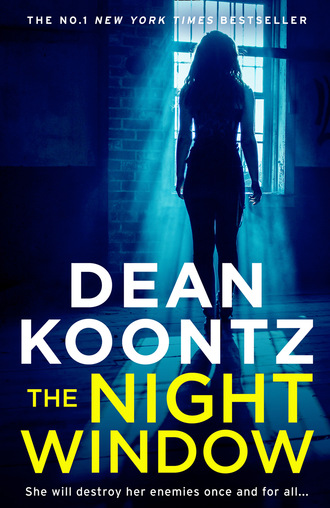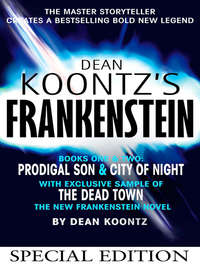
Полная версия
The Night Window
Massaging his arm where she’d hit him, Vikram thought about what he’d done. After a silence, he said, “I guess it could have gotten ugly at that point.”
“Ugly. Oh, you don’t know ugly.”
“But it didn’t.” He grinned and said, “You know why it didn’t get ugly? Because Enrique is hot for you.”
“That’s not exactly news to me, Vikram. If I didn’t have the widow-in-mourning excuse, I’d have had to pull a gun on Ricky more than once.”
“I explained to him how I could help you if I could find you, how I could almost surely find you if I knew what you were driving. I gave him a demonstration on his computer, how I can backdoor everyone from the FBI to the National Security Agency to Homeland Security. He was mega impressed. He offered me a position with his company.”
“It’s not a company, Vikram. It’s a criminal operation.”
“Anyway, he was excited to think you might survive all this and then you’d owe him and maybe think of him as Sir Gilligan.”
“Who?”
“I realized he meant Galahad, from the knights of the Round Table, but I didn’t think it would be smart to correct him.”
“That’s why you still have a tongue.”
“Anyway,” Vikram said, pointing at the roof again with his right index finger, “the important thing is he believed me. He told me what he’d last sold you and what license plates he put on it.”
Nationwide, most police cruisers and many government vehicles were equipped with 360-degree license-plate-scanning systems that automatically recorded the numbers from all the vehicles around them. They continuously transmitted the data to regional archives but also to the National Security Agency’s million-square-foot data center in Utah.
Three years ago, at the instruction of corrupt officials high in the Department of Justice, Vikram had installed a rootkit in the NSA’s system. This powerful malware program functioned at such a low level that he could swim through their data troves without risk of drawing the attention of IT security sharks.
Although he had delighted in demonstrating his genius—his wicked little babies—to Jane, although he had taught her how to backdoor telecom companies, the Department of Motor Vehicles in any of the fifty states, and numerous other entities, he had carefully avoided exposing her to charges of espionage. He had never shown her how to access the NSA or any other intelligence service.
So after making a new best friend in Enrique de Soto, he had backdoored the NSA to search the archives of license-plate scans for the number that Ricky had provided when he’d sold the Ford Explorer Sport to Jane.
“In the less than two weeks you’ve had the vehicle,” Vikram said, “the plates have been scanned on twelve occasions. Twice in Arizona. Otherwise in various places in Southern California. The most recent was Wednesday, in the San Fernando Valley, on Roscoe Boulevard, by a scanner-equipped car belonging to the Environmental Protection Agency.”
The NSA also retained vast video files from key public-building security cameras and from tens of thousands of traffic cams in major metropolitan areas. Using the date and time—12:09 P.M.—of the EPA automatic recording of the Explorer license plate, Vikram accessed those video archives to review the intersections of Roscoe Boulevard and other streets in the vicinity of the sighting.
“It was Wednesday evening when I was tooling this, using my laptop in a hipster hotel in Santa Monica. I found your Explorer on video in ten minutes and followed it nine blocks to the Counting Sheep, where it seemed you’d taken a room early that afternoon. So then I got in my car and drove there for real, and sure enough your SUV was parked right in front of Room Three. Before you hit me again, consider that if it was the black hats who had that license number, you’d already be in their custody or dead.”
Jane grimaced. “I’m not going to hit you again.”
“But I’ll understand if you do. Totally. Unequivocally. I now understand your point of view. Enrique. Viper. Out of my league.”
“If you were at the motel two nights ago, why didn’t you contact me then?”
“The math was still way bad. High probability that you would’ve shot me on sight, at least to wound.”
“What—your formulas are based on the assumption I’m trigger-happy?”
“No, no, no. But math is math. I went back to my hotel and cooked up my little scenario in about an hour and got my cast together, and it worked out great.”
Although he was thirty, there was a part of Vikram that would be forever an ebullient teenager.
“Sweetie,” Jane said affectionately, to be sure that she had his complete attention, “do you understand how deep the shit is that you’re in now?”
“Up to my chin,” he said with a smile. “But you need help. You need a friend. I am your friend.”
“How do you know I’m not as evil as they claim?”
“Don’t be ridiculous.”
“Maybe I did kill Nick, just like they say. Maybe I sold national security secrets. Maybe you don’t know me at all.”
“I know you. My heart tells me who you really are.”
“Your heart, huh?”
“Heart and brain and intuition. You are good to the bone.”
She sighed and shook her head. “No one is good to the bone. The things I’ve done, had to do—you don’t know. Do you also realize, if you become a target of these people, your family will be targeted, too, everyone you drew into your ‘little scenario’?”
“I’ve taken care of my relatives. They’re deeply hidden. Deeply, deeply. The black hats know nothing about them.”
“Wrong. This is Google World, Facebook World, Big Brother masquerading as Big Friend, so they know everything about your family, including what underwear they buy.”
“They have vanished in the mists,” Vikram insisted. “They can’t be found.”
“Anyone can be found.”
“They haven’t found you.”
“More than once they have. It’s been so close I just about had to shed my skin to slip away.”
“Anyway, they don’t have to stay hidden for long. Just until we vindicate you and destroy your enemies.”
In the interest of keeping him real, she gave him some snark. “This is Friday evening. Do you figure to finish the job by Sunday?”
A huge flatbed eighteen-wheeler with tires as large as those on a supersized earthmover came off the interstate. Like prison-yard searchlights, the headlamp beams washed through the Explorer. The truck driver, high in his cab, wore sunglasses at night and looked as hard-faced as a robot. An enormous construct of some kind was chained to the flatbed and concealed by canvas tarps. It was all quite ordinary, surely, but lately even the most mundane things often seemed strange and menacing.
When the truck passed and the sound of it faded, Vikram said, “For every back door I built into a computer system, at the order of someone at Justice—and even twice for the FBI director himself—I also built a second back door for my personal use. They weren’t wise to that. The old guard is enthusiastic about the power that technology can give them but at the same time ignorant about it. They knew epsilon about what I was doing for myself.”
Weariness had pulled Jane down in her seat. Now she sat up straight behind the wheel.
Vikram spoke fast, as if afraid she wouldn’t give him time to win her over. “So now I can ghost through any intelligence-service, law-enforcement, or government computer system of consequence. I can read the encrypted internal emails of every warped agent of every gone-to-the-dark-side agency searching for you. It’s all archived, this history of evil scheming. I’d already been phantom reading, which is how I caught sly passing references to Arcadians now and then. I didn’t know what it meant, but it seemed like they must be some kind of secret society. So then what I did is I scanned a humongous amount of text messages of anyone who mentioned Arcadians, searching for other unusual words that maybe were dog whistles, you know, that meant something special to them. And I found terms they shared like ‘adjusted people’ and ‘brain-screwed’ and something called the ‘Hamlet list,’ though I haven’t been able to figure out what any of it means. I also kept seeing these weird references to a central committee, regional commanders, cell leaders, as if they’re some crazy nest of total revolutionaries. And then what I did is I developed this algorithm, an app to scan all archived messages by the tens of thousands per hour and identify as many people as possible who are using these terms.”
When Vikram ran out of breath, Jane took a moment to find her voice. “You … you’ve got names?”
“Lots of names.”
“How many? A hundred? Two hundred?”
“More than three thousand eight hundred.”
“Holy shit.”
“Some of them are real pooh-bahs, top of the food chain in government, industry, the media.”
Jane had killed several Arcadians who had given her no choice but to cut them down, and she had identified others, perhaps a score of them, maybe two score. “I’ve been collecting evidence, but … but you put together a whole damn membership directory.”
“I’m sure it’s nowhere near complete, but it will be in a few days. What exactly are they up to? Why do all these people want you dead? Did they kill Nick? Why did they kill him?”
Hope thrilled through her, a positive expectation more intense than anything she had felt in weeks. A prickling sensation traced the ladder of her spine, and her heart beat faster, and something akin to joy induced a deep pleasurable shudder. “Vikram, you’re a genius.”
“Yes, I know. But you’re a genius, too. I’ve reviewed your Bureau file. Your IQ is one-sixty-five.”
“I couldn’t have done what you’ve done,” she said.
“Well, I can’t do the things you do. You’re right—I would be a danger to myself with a gun.”
“I’m sorry I called you a bunny rabbit.”
He shrugged. “There’s some truth in the description. Though I would die for you.”
“Don’t say that. Don’t even think it.”
“Well, but I would.” He looked away from her, gazed into the cloistered realm of the aged industrial district, where the shadows seemed sentient and sinister, where the inadequate lights distorted and concealed more than they revealed. In a voice softened by the particular modesty that is a sensitive shrinking from any indelicate subject, he said, “I’ve admired you for a long time. I won’t call it more than admiration. It can’t lead to anything more. I understand that. I don’t mean to embarrass you, and you must not respond, there is no possible response, but I just needed to say it.”
She reached out and took his hand and brought it to her lips and kissed it once.
Having difficulty swallowing, her chest tight with emotion, she switched on the headlights, pulled away from the curb, and returned to the interstate.
8
The false twilight of the storm gave way to the true twilight. Darkness came down through the stately pines with the wind-driven crystalfall, and the fragrant trees arrayed themselves in the blizzard’s ermine, so that little of the snow accumulated on the floor of the woods. On sunny days, not much sunlight penetrated the layered vaults of needled branches, and there was little underbrush to inhibit progress.
Tom Buckle was able to move surely if not swiftly among the evergreens. However, the progress that the terrain allowed didn’t build his confidence. Until he found the river, Crystal Creek, he couldn’t know whether he was heading in the right direction, and the river eluded him. He seemed to be moving southeast in a straight line toward the interstate, but in truth he had no references by which he could determine direction. Maybe, in these parts, moss grew only on the north face of the trees or perhaps the pines inclined toward the eastern sun because the mountains to the west shortened the afternoon, but he was no Daniel Boone, and he was likely to be wrong about everything he imagined from moss to inclination. He was half-afraid that he might not be making any headway at all, that in his disorientation, he might be circling through the woods and, were he to switch on the Tac Light, would find himself tramping across tracks he had made earlier.
In this forest of the night, Tom was not blind, but his dark-adapted eyes left him half-sighted. The architecture of nature was rendered in shades of gray and shapes without detail, and at the farther limits of vision, the woods seemed amorphous, changing. The trees were marshaled like the ranks of an army of silent giants in a dream, awaiting violent action. He wanted to cover as much ground as possible before using the Tac Light, for fear that Wayne Hollister might be nearer than he knew. But then he arrived at a shape that nature hadn’t made, a looming irregularity in the sameness of pines. He heard a low rhythmic sound distinct from the steady drone of the wind and the hiss of the needled boughs that combed it.
He dared the flashlight at its least intense setting. Before him stood a square, windowless structure of tightly mortared native stone, about eight feet on a side, too small to be inhabited. The four slopes of the roof met at a pinnacle that featured a finial like a large ice pick encircled by an eggbeater. Mounted on each slope, aimed into its quadrant of the forest, a bowl-like object about three feet in diameter had sloped walls funneling to a depth of perhaps eighteen inches, from the center of which protruded a finely textured cone.
Tom’s gut fluttered as if cocooned within it were some winged thing eager to fly free, and the chill that climbed his spine had nothing to do with the cold against which he was outfitted.
The rhythmic, muffled thumping seemed to come from under the small building. He doubted that it could be anything other than the leaden chugging of a propane-fueled generator supplying power to whatever the structure contained.
The bowl-like objects on the roof were reminiscent of high-gain antennas. In fact, they could be nothing else.
He thought he understood what he had come upon, but he needed to be certain about the purpose of this place. He put the Tac Light on the ground, tilted it to illuminate the door, and withdrew the gun from the zippered pocket on the right leg of his insulated storm suit. He had only ten rounds, but he couldn’t conceive of needing more than two or three in any confrontation with Hollister; if he didn’t kill the man with the first few shots, he would be cut down himself. Heedless of ricochets and shrapnel, he aimed at the door and fired three rounds into the wood between the metal escutcheon and the jamb, the crack of pistol fire echoing loudly through the dark and frosted woods.
Bullet-split wood splintered the air, and the muzzle smoked, and the guts of the lock rattled when he kicked the door, rattled louder on the second kick. The door burst open when he kicked it a third time.
Warm air breathed over him. Like the tiny green, red, and white eyes of some exotic vermin, scores of indicator lights regarded him from the darkness within. He felt for a wall switch to the left of the door, found it. Banks of arcane equipment were revealed along three walls of the hut.
Wainwright Warwick Hollister was one of the world’s wealthiest men, and as such he had enemies. Indeed, he evidently thought the entire free society in which he lived was a threat to him. He seemed to be in the grip of profound paranoia. Tom intuited the purpose of this building. The billionaire feared that if a hit team somehow got onto this vast property undetected, they would first marshal their forces in the cover of timberland and then make their way within striking distance of the main house by staying as much as possible within one swath of forest after another. This hut was an automated listening post, of which there were no doubt more situated in other isolate woods. Computers running sound-analysis programs would seine from the common chorus of nature any noises that implied a human presence and would alert the security detail at the main residence.
Hollister didn’t need to track bootprints in the snow or search the storm-shrouded night for the flicker of a flashlight. He need not have the knowledge of an Indian scout of another era. He was at this moment being informed telemetrically that Tom Buckle was transiting these particular acres of pines.
In fact, the moment the door of the hut had been breached, an alarm—silent to Tom—surely would have alerted those at the house. No doubt Hollister, whether on foot or in a vehicle, had likewise been informed by way of whatever communications device he carried.
The hunter was even now venturing through this island of trees or approaching its shores, and he knew precisely where his quarry could be found.
Gripping the pistol in his right hand, Tom Buckle snatched the Tac Light off the ground with his left, turned from the hut, and ran the gauntlet of evergreens. His eyes were not dark-adapted anymore. And he could no longer presume that darkness would avail him more than speed. He kept the Tac Light on its broadest, palest setting, the better to see optional pathways through the pines, but also because its narrowest, brightest beam was so intense that, on a clear night, it could be seen two miles away. The density of the woods precluded detection at such a distance, but Hollister was likely to be much nearer than that and perhaps closing fast.
The thick-growing woods, seeming to condense around him as he ran, made it unlikely that he would be shot in flight, even if the billionaire was armed with a fully automatic carbine. Scattered patches of the dirty crusted snows of other days and a thick carpet of pine needles provided treacherous footing. However, the greatest danger came from low-hanging branches, of which there were few in this mature woods, though not few enough.
He had lost all sense of direction. He wanted only to flee from the hut and find a meadow, where the faint phosphorous glow of the snowfield would make the flashlight unnecessary. Perhaps there would be no high-tech listening stations in the open land, where Hollister need not fear that assassins might gather undetected.
The billionaire’s voice played in memory as Tom ran: I am also a fair man, Tom. In the contest to come, you will have a chance to survive.
Perhaps a fragile thread of truth wove through Hollister’s tapestry of lies, but the devil was in the definitions of fair and chance. He was as fair as certain poisonous spiders are fair when they paralyze their prey with venom that leaves them feeling no pain while later they are eaten alive. And one chance in a thousand is still a chance, as is one in ten thousand.
9
Traffic congealed again, and during the rushless last hour of their journey to Newport Beach, Jane told Vikram Rangnekar about Bertold Shenneck’s nanoweb implants, the Hamlet list, the adjusted people, the brain-scrubbed rayshaws shorn of memory and personality, reprogrammed as stoic and obedient killing machines. She explained the degree to which the cabal could influence—maybe even control—the majority of media outlets, as well as the extent of their infiltration into the FBI, Homeland Security, NSA, and other national security and law-enforcement agencies. She skimmed through the high points of her actions in recent weeks, quickly describing what evidence she had gathered.
Although Jane’s story sounded like a fever dream even to her, Vikram listened with just a few interruptions, and his silence signified neither disbelief nor even skepticism. What he had learned on his own were pieces of a puzzle that clicked into place with each of her revelations, forming a dire picture that was as logical and convincing as it was dark and strange. Each time she glanced at him, his sweet face hardened further from disquiet to dismay to dread. Once when he met her glance, she saw a horror of the future in his large, expressive eyes.
Nearing Newport, as Jane transitioned from Interstate 405 to State Highway 73, Vikram said, “If we could capture one of these adjusted people and put him through an MRI, would we see proof of this brain implant?”
“I guess so. I don’t really know. I don’t think we could get one of them to cooperate, and even if we saw proof, I’m not sure we could drill through the media blackout on all of this.”
“The Arcadians have it locked down that tight?”
“I don’t know how many journalists, publishers, and other media types are true believers in the cause and how many might be adjusted people, brain-screwed, being controlled by Techno Arcadians. But, yeah, they seem able to block all reportage of this.”
The congestion relented again, and traffic was moving fluidly.
As they descended to the new freeway via an elevated connector, Jane saw a patrol car below, snugged against the right-hand shoulder of the roadway, waiting for an unsuspecting motorist to enter the down ramp faster than the posted speed allowed. She looked at the speedometer. She was all right.
“A few weeks ago,” she continued, “I spoke to a forensic pathologist, Dr. Emily Rossman, who had worked in the Los Angeles medical examiner’s office. When she trephined the skull of a woman who committed suicide, she saw the nanoweb.”
They swept past the cruiser and merged one lane to the left, heading south on State Highway 73. In the rearview mirror, she saw the patrol car’s headlights bloom. Its roof-mounted lightbar suddenly blazed and began flashing with authority.
“Dr. Rossman saw a gossamer fairylike structure of intricately designed circuits netting all four lobes of the brain, disappearing into various sulci, with a concentration on the corpus callosum. She was scared shitless. She thought she was looking at evidence of an extraterrestrial invasion.”
The patrol car was coming up fast behind them, but no siren wailed yet.
“Shortly after Dr. Rossman opened the cadaver’s skull, maybe as a reaction to contact with the air, the nanoweb dissolved. She said it was ‘like the way certain salts absorb moisture from the air and just deliquesce.’”
Still without a siren, the cruiser moved one lane to the left of the Explorer and sped past, dwindling in the night as if it, too, were a construct of deliquescent salts.
“There was residue?” Vikram asked.
“Some. Dr. Rossman sent it to the lab. She never got the report because the next day she was told to leave and accept severance pay or be fired. They had trumped up a charge against her.”
“Don’t they videotape autopsies?”
“As I recall, the video disappeared.”
Vikram pointed to a sign that listed upcoming exits. “We’re close now. Get off at MacArthur Boulevard.”
The patrol car was nearing the top of the exit ramp as Jane drove onto the bottom of it.
Halfway up the ramp, she glanced in the rearview mirror to see if another black-and-white might be tailing her. Nothing.
She said, “I feel boxed in even when I’m not.”
“Which is why you’ve survived this long.”
From MacArthur Boulevard, they turned onto Bison—and saw a cluster of four police vehicles in front of a store in an upscale strip mall to the right.
“Tell me that’s not where we’re going,” Jane said.
“It’s not. Turn right at the next corner.”
He pointed to a self-storage facility on the north side of the street. “There’s a package waiting for us. A ladder to the stars.”
10
The clear heavens of the day have slipped behind blankets heavy with unspent rain to bed down for the night. In the southeast, as the sea of clouds rolls across the last quadrant of the sky, the moon is drowning.
La Cañada Flintridge, in the foothills of the San Gabriel Mountains, north and east of Los Angeles, offers a high-quality suburban lifestyle, neighborhoods of well-kept homes on tree-lined avenues. Strangely, the pavement is in need of considerable repair and the lampposts provide no light on the street where Ashok Rangnekar lives with his wife, Doris.
Charlie Weatherwax, missionary for the truth of random cruelty, is being driven by the second-in-command of his four-member crew, Mustafa al-Yamani. Because they are valued members of the Arcadian revolution, they have been assigned a luxury SUV, a Mercedes-Benz G550 Squared with a 4.0-liter 416-horsepower biturbo V8, which will go from zero to sixty miles per hour in 5.8 seconds, provided at the expense of the Department of Homeland Security, which is one of the agencies for which they hold valid credentials.







